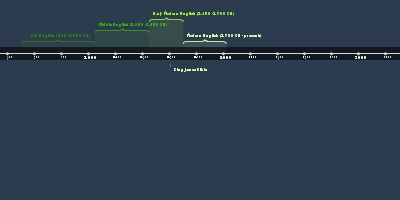William Shakespeare (1564 - 1616 CE) (1 janv. 1564 – 1 janv. 1616)
Description:
The Elizabethan Era was also the time of playwright William Shakespeare (1564 - 1616 CE), an individual whom many credit for single-handedly shaping the English language into what it is today. Through his poems and plays, Shakespeare introduced around 1700 new words into the English language that are still commonly used in modern English (SIDE NOTE: these words may have been previously used colloquially at the time, such as the verb phrase “to bet”. However, it was Shakespeare who first used them in the written form. Through his works, Shakespeare popularised these terms and helped ensure their presence in modern English). Moreover, Shakespeare also introduced countless frequently used idioms, including “the be-all and end-all”, “come full circle” and “in one fell swoop”.A lot of the words introduced by Shakespeare were created through compounding, combining free morphemes to create a new word. Examples include “downstairs”, “birthplace”, “eyeball” and “watchdog”. He also created numerous compound adjectives by combining adjectives with past participles, such as “cold-hearted”, “well-educated” and “ill-tempered”. Another way Shakespeare created new words would be through affixation, words like “successful”, “amazement”, “misquote” and “countless”. Other words were coined by removing affixes, such as “impede” from “impediment” or “negotiate” from “negotiation”. Furthermore, Shakespeare helped popularise the use of the same word being used for numerous word classes. For example, verbs such as “bump” and “hint” were sometimes used as nouns. Some existing words were also given new meanings under Shakespeare, such as the adjective “cheap” being used to mean low quality or vulgar. Additionally, lexemes from Latin and French were re-introduced, such as “retirement” (French). Collocations such as “on purpose” or “the <thing> in question” also have their origins in Shakespeare.
The prominence and popularity of Shakespeare’s works at the time allowed him to shape the English language into what it is today. Not only did he expand on the vocabulary, but also helped to standardise the rules of grammar and spelling as well. Evidently, Shakespeare’s influence on the English vernacular cannot be understated.
Ajouté au bande de temps:
Date:
1 janv. 1564
1 janv. 1616
~ 52 years
